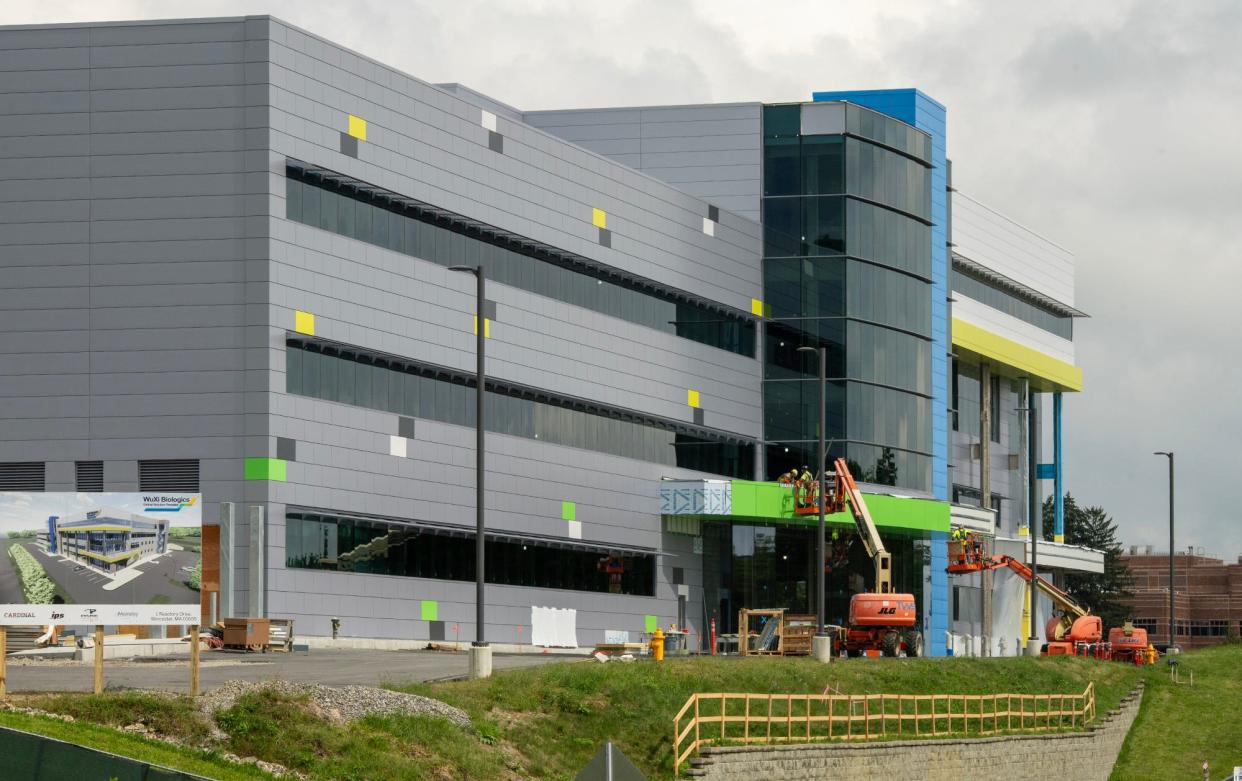Report: Mass. life sciences grew in 'toughest times' in Worcester, Suffolk counties

- Oops!Something went wrong.Please try again later.
BOSTON — Massachusetts' growing biopharma workforce is expanding beyond Cambridge's life sciences hub and into Suffolk and Worcester counties, according to a new industry-sponsored report.
MassBio, which represents more than 1,600 organizations in the global life sciences and health care sectors, said in its industry snapshot that its membership has spread out from Cambridge and Boston at an unprecedented rate.
But as companies look to continue their success in Massachusetts, biopharma leaders and industry lobbyists say partnerships with state officials are crucial to remain in a "leadership position.
"Even amidst challenging times for biotech companies, we still saw our industry's workforce expand by nearly 7 percent," MassBio CEO and President Kendalle Burlin O'Connell said in a statement. "While we all know biotech experienced a period of cooling after a red hot few years, our workforce growth, lab space expansion, large share of overall national VC investments, and strong government relationships make me hopeful for a strong 2024 and beyond."
State assistance is needed, O'Connell said, to protect vulnerable pre-revenue biotech companies including those working on complex drug development.
The state's biopharma industry had nearly 114,000 employees in 2022, compared to 106,779 in 2021, the report said. The increase in Massachusetts biomanufacturing jobs, which MassBio said eclipsed most competitors, stands in contrast to losses seen in California, Texas and New York.
In Worcester County, the biomanufacturing workforce grew by 18%, while the research and development workforce in Suffolk County increased by 17%, according to the report.
There are 332 MassBio member companies in Cambridge and 145 in Boston, the report said, but there are also 64 companies in Waltham, 58 in Watertown, 46 in Woburn, 40 in Lowell, 36 in Natick, 33 in Newton, 32 in Mansfield, 31 in Beverly, 30 in Somerville and 29 in Lexington, among other municipalities.
Rep. John Lawn, co-chair of the Joint Committee on Health Care Financing, said municipalities beyond the "urban core" are beginning to experience the benefits of the biopharma industry.
"Representing Waltham and Watertown, I have seen firsthand how the presence of this industry can positively impact a community," Lawn said in a statement included in the report. "From a diversified tax base to consistent foot traffic, life sciences development has the ability to be an economic driver in addition to everything it does for patients."
MassBio said the number of biopharma employees has grown by 110% since former Gov. Deval Patrick signed an initiative in 2008 that pumped $1 billion into the life sciences sector over a 10-year period.
At the BIO International Convention in June, Gov. Maura Healey pledged she would continue that investment — which was extended by former Gov. Charlie Baker and the Legislature — to bolster the state's economic development and competitiveness. Healey said details such as the scope and duration of a reauthorized initiative would be shared by the end of the year.
At the Boston convention, Healey also promoted a MassTalent platform to expand the workforce in sectors like life sciences, clean energy and advanced manufacturing, backed by $50 million to support partnerships for training partners and companies.
Takeda is the state's largest biopharma employer, with 6,290 employees, according to the report. That's followed by Sanofi with 4,600 employees, Moderna with 4,163 and Vertex with 3,400.
Biopharma companies based in Massachusetts secured almost one-third of national venture capital dollars in the first half of 2023, with more than half flowing to communities outside Cambridge, according to the report.
MassBio said the construction of 6 million square feet of new life sciences space in 2022 means companies have more options for where they choose to do business. That's in contrast to the industry's former real estate market plagued by low vacancy rates and rising rents.
Some of the largest new labs and leases last year were in Andover, Bedford, Burlington, Lexington, Devens and Waltham, in addition to Boston and Cambridge, according to the report.
Nearly 100 Massachusetts cities and towns are on the highest tier of a MassBio rating system that gauges whether municipalities are ready to host biotechnology facilities. The scoring is based on local zoning laws and infrastructure capacity.
This article originally appeared on Telegram & Gazette: Report: Mass. life sciences grew in 'toughest times' in Worcester, Suffolk counties

